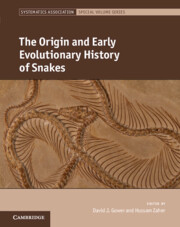Book contents
- The Origin and Early Evolutionary History of Snakes
- The Systematics Association Special Volume Series
- The Origin and Early Evolutionary History of Snakes
- Copyright page
- Dedication
- Contents
- Contributors
- Preface
- 1 Introduction
- Part I The Squamate and Snake Fossil Record
- Part II Palaeontology and the Marine-Origin Hypothesis
- Part III Genomic Perspectives
- Part IV Neurobiological Perspectives
- Part V Anatomical and Functional Morphological Perspectives
- 16 Diversity and Evolution of Squamate Hemipenes
- 17 The Evolution of Sperm-Storage Location in Squamata with Particular Reference to Snakes
- 18 An Overview of the Morphology of Oral Glands in Snakes
- 19 Macrostomy, Macrophagy, and Snake Phylogeny
- Index
- Series page
- References
18 - An Overview of the Morphology of Oral Glands in Snakes
from Part V - Anatomical and Functional Morphological Perspectives
Published online by Cambridge University Press: 30 July 2022
- The Origin and Early Evolutionary History of Snakes
- The Systematics Association Special Volume Series
- The Origin and Early Evolutionary History of Snakes
- Copyright page
- Dedication
- Contents
- Contributors
- Preface
- 1 Introduction
- Part I The Squamate and Snake Fossil Record
- Part II Palaeontology and the Marine-Origin Hypothesis
- Part III Genomic Perspectives
- Part IV Neurobiological Perspectives
- Part V Anatomical and Functional Morphological Perspectives
- 16 Diversity and Evolution of Squamate Hemipenes
- 17 The Evolution of Sperm-Storage Location in Squamata with Particular Reference to Snakes
- 18 An Overview of the Morphology of Oral Glands in Snakes
- 19 Macrostomy, Macrophagy, and Snake Phylogeny
- Index
- Series page
- References
Summary
Oral glands underwent substantial modification during the origin and diversification of snakes. Oral glands have provided rich data for snake systematics, and for informing evolutionary scenarios about the adaptive radiation of snake feeding. However, sampling has been patchy, and many questions remain about gland homology, function and evolution. This chapter addresses labial (supra- and infralabial), temporomandibular, rictal, sublingual, premaxillary, accessory and dental (= venom and Duvernoy’s) glands. We review and synthesize developments and data and present new histological sections and high-resolution tomography of some snakes and lizards, providing descriptions and illustrations of oral glands and associated structures. We comment on labial and dental glands of some toxicoferan and non-toxicoferan lizards, and report the first observation of a possible infralabial gland in a dibamian lizard. There are insufficient data to resolve all outstanding questions about gland homology across lizards and snakes, but the ancestral snake possibly had rictal and lacked dental (venom) glands, the latter perhaps evolving only within colubroidean caenophidians.
Keywords
Information
- Type
- Chapter
- Information
- The Origin and Early Evolutionary History of Snakes , pp. 410 - 436Publisher: Cambridge University PressPrint publication year: 2022
References
Accessibility standard: Unknown
Why this information is here
This section outlines the accessibility features of this content - including support for screen readers, full keyboard navigation and high-contrast display options. This may not be relevant for you.Accessibility Information
- 3
- Cited by
